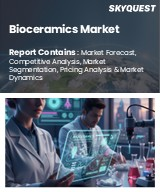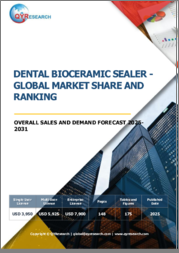
|
시장보고서
상품코드
1702164
바이오세라믹 시장 보고서 : 재료, 생체 적합성, 용도, 지역별(2025-2033년)Bioceramics Market Report by Material (Alumina, Zirconia, and Others), Biocompatibility (Bio-inert, Bio-active, Bio-resorbable), Application (Dental Care, Orthopedics, and Others), and Region 2025-2033 |
||||||
바이오세라믹 세계 시장 규모는 2024년 191억 달러에 달했습니다. 향후 IMARC Group은 2033년까지 시장 규모가 323억 달러에 달하고, 2025-2033년 연평균 성장률(CAGR)은 5.72%를 보일 것으로 전망하고 있습니다.
바이오세라믹은 근골격계 질환이나 손상된 부위를 복구하거나 대체하는 데 사용되는 세라믹 재료의 하위 클래스를 말합니다. 바이오세라믹의 제조에 사용되는 일반적인 재료로는 생체 활성 유리, 재흡수성 인산칼슘, 하이드록시아파타이트 등이 있습니다. 또한 생체 적합성, 무독성, 치수 안정성, 화학적 불활성 등 특정 유익한 특성을 가지고 있습니다. 그 결과, 바이오세라믹은 만성 척추 만곡 교정, 골절 정렬 및 수리, 선천성 기형 치료 등 다양한 용도의 정형외과용 내하중 코팅, 치과용 임플란트, 뼈 이식 대체재, 뼈 시멘트 등 다양한 용도로 사용되고 있습니다.
바이오세라믹 시장 동향 :
환자의 신체에 대한 수용성을 높이고 수술 후 감염 발생을 낮추기 위해 생체 적합성 재료에 대한 요구가 증가하고 있는 것이 주로 세계 바이오세라믹 시장을 주도하고 있습니다. 또한, 골다공증, 골관절염, 류마티스 관절염, 허리 및 목 통증과 같은 근골격계 질환이 특히 노인들 사이에서 증가하고 있는 것도 세계 시장에 밝은 전망을 가져다주고 있습니다. 이와 더불어, 인공관절 치환술의 경우 의사가 조기에 수술적 개입을 하는 새로운 트렌드가 무릎, 어깨, 고관절 임플란트 사용을 촉진하고 있으며, 이는 시장 성장을 가속하고 있습니다. 또한, 식습관의 변화와 영양 부족으로 인해 충치가 증가하고 치아 건강이 악화되고 있습니다. 그 결과, 크라운, 브릿지, 칫솔에 대한 수요가 증가하여 결국 치과 치료에서 바이오세라믹의 보급률 증가에 기여하고 있습니다. 또한, 임플란트 위치 결정에 있어 환자와 외과 의사에게 편리함을 제공하는 경량성으로 인해 탄소 바이오세라믹의 인기가 높아지고 있는 것도 중요한 성장 촉진요인으로 작용하고 있습니다. 이와는 별도로 지르코니아 강화 알루미나 및 인산칼슘 코팅을 포함한 새로운 첨단 재료의 도입은 향후 몇 년 동안 세계 바이오세라믹 시장의 성장에 기여할 것으로 예측됩니다.
본 보고서에서 다룬 주요 질문
- 2024년 세계 바이오세라믹 시장 규모는?
- 2025-2033년 바이오세라믹 시장 세계 시장 성장률은?
- 세계 바이오세라믹 시장을 이끄는 주요 요인은?
- 코로나19가 세계 바이오세라믹 시장에 미치는 영향은?
- 세계 바이오세라믹 시장의 재료별 시장 현황은?
- 세계 바이오세라믹 시장의 용도별 시장 현황은?
- 세계 바이오세라믹 시장의 주요 지역은?
- 세계 바이오세라믹 시장의 주요 기업은?
목차
제1장 서문
제2장 조사 범위와 조사 방법
- 조사 목적
- 이해관계자
- 데이터 소스
- 1차 정보
- 2차 정보
- 시장 추정
- 보텀업 접근
- 톱다운 접근
- 조사 방법
제3장 주요 요약
제4장 서론
- 개요
- 주요 업계 동향
제5장 세계의 바이오세라믹 시장
- 시장 개요
- 시장 실적
- COVID-19의 영향
- 시장 예측
제6장 시장 분석 : 재료별
- 알루미나
- 지르코니아
- 기타
제7장 시장 분석 : 생체 적합성별
- Bio-inert
- Bio-active
- Bio-resorbable
제8장 시장 분석 : 용도별
- 치과 케어
- 정형외과
- 기타
제9장 시장 분석 : 지역별
- 북미
- 미국
- 캐나다
- 아시아태평양
- 중국
- 일본
- 인도
- 한국
- 호주
- 인도네시아
- 기타
- 유럽
- 독일
- 프랑스
- 영국
- 이탈리아
- 스페인
- 러시아
- 기타
- 라틴아메리카
- 브라질
- 멕시코
- 기타
- 중동 및 아프리카
- 시장 내역 : 국가별
제10장 SWOT 분석
- 개요
- 강점
- 약점
- 기회
- 위협
제11장 밸류체인 분석
제12장 Porter의 Five Forces 분석
- 개요
- 바이어의 교섭력
- 공급 기업의 교섭력
- 경쟁 정도
- 신규 진출업체의 위협
- 대체품의 위협
제13장 가격 분석
제14장 경쟁 구도
- 시장 구조
- 주요 기업
- 주요 기업 개요
- CAM Bioceramics B.V.
- Carborundum Universal Limited(Murugappa Group)
- CeramTec GmbH
- CoorsTek Inc.
- Dentsply Sirona
- Koninklijke DSM N.V.
- Straumann
- Stryker Corporation
The global bioceramics market size reached USD 19.1 Billion in 2024. Looking forward, IMARC Group expects the market to reach USD 32.3 Billion by 2033, exhibiting a growth rate (CAGR) of 5.72% during 2025-2033.
Bioceramics refers to a subclass of ceramic materials that are used to repair and replace diseased and damaged parts of the musculoskeletal system. Some of the commonly available materials utilized in the production of bioceramics include bioactive glass, resorbable calcium phosphates, hydroxyapatite, etc. Additionally, they have certain beneficial characteristics, including biocompatibility, non-toxicity, dimensional stability, and chemical inertness. As a result, bioceramics are used in orthopedic load-bearing coatings, dental implants, bone graft substitutes, and bone cement for several applications, such as correcting chronic spinal curvature, aligning and repairing fractures, treating congenital deformities, etc.
Bioceramics Market Trends:
The escalating requirement for biocompatible materials to increase acceptance by the patients' bodies, as well as lower the occurrence of post-surgery infections is primarily driving the global bioceramics market. Moreover, the growing incidences of musculoskeletal conditions, including osteoporosis, osteoarthritis, rheumatoid arthritis, back and neck pain, etc., especially among the geriatric population, are also creating a positive outlook for the global market. Besides this, the emerging trend of early surgical intervention by doctors in case of joint replacements is fueling the utilization of knee, shoulder, and hip implants, which in turn, is propelling the market growth. Furthermore, the changing food consumption patterns along with the lack of nutrition in diet have resulted in the increasing cases of cavity formation and deteriorated dental health. This, in turn, has led to the elevating need for crowns, bridges, and bristles, eventually contributing to the rising penetration of bioceramics in dental care. Additionally, the escalating popularity of carbon bioceramics owing to its lightweight nature, which offers convenience to patients and surgeons in terms of implant positioning, is also acting as a significant growth-inducing factor. Apart from this, the introduction of new advanced materials, including zirconia toughened alumina and calcium phosphate coatings, is projected to cater to the growth of the global bioceramics market in the coming years.
Key Market Segmentation:
Breakup by Material:
- Alumina
- Zirconia
- Others
Breakup by Biocompatibility:
- Bio-inert
- Bio-active
- Bio-resorbable
Breakup by Application:
- Dental Care
- Orthopedics
- Others
Breakup by Region:
- North America
- United States
- Canada
- Asia-Pacific
- China
- Japan
- India
- South Korea
- Australia
- Indonesia
- Others
- Europe
- Germany
- France
- United Kingdom
- Italy
- Spain
- Russia
- Others
- Latin America
- Brazil
- Mexico
- Others
- Middle East and Africa
Competitive Landscape:
The competitive landscape of the industry has also been examined along with the profiles of the key players being CAM Bioceramics B.V., Carborundum Universal Limited (Murugappa Group), CeramTec GmbH, CoorsTek Inc., Dentsply Sirona, Koninklijke DSM N.V., Straumann and Stryker Corporation.
Key Questions Answered in This Report
- 1.What was the size of the global bioceramics market in 2024?
- 2.What is the expected growth rate of the global bioceramics market during 2025-2033?
- 3.What are the key factors driving the global bioceramics market?
- 4.What has been the impact of COVID-19 on the global bioceramics market?
- 5.What is the breakup of the global bioceramics market based on the material?
- 6.What is the breakup of the global bioceramics market based on the application?
- 7.What are the key regions in the global bioceramics market?
- 8.Who are the key players/companies in the global bioceramics market?
Table of Contents
1 Preface
2 Scope and Methodology
- 2.1 Objectives of the Study
- 2.2 Stakeholders
- 2.3 Data Sources
- 2.3.1 Primary Sources
- 2.3.2 Secondary Sources
- 2.4 Market Estimation
- 2.4.1 Bottom-Up Approach
- 2.4.2 Top-Down Approach
- 2.5 Forecasting Methodology
3 Executive Summary
4 Introduction
- 4.1 Overview
- 4.2 Key Industry Trends
5 Global Bioceramics Market
- 5.1 Market Overview
- 5.2 Market Performance
- 5.3 Impact of COVID-19
- 5.4 Market Forecast
6 Market Breakup by Material
- 6.1 Alumina
- 6.1.1 Market Trends
- 6.1.2 Market Forecast
- 6.2 Zirconia
- 6.2.1 Market Trends
- 6.2.2 Market Forecast
- 6.3 Others
- 6.3.1 Market Trends
- 6.3.2 Market Forecast
7 Market Breakup by Biocompatibility
- 7.1 Bio-inert
- 7.1.1 Market Trends
- 7.1.2 Market Forecast
- 7.2 Bio-active
- 7.2.1 Market Trends
- 7.2.2 Market Forecast
- 7.3 Bio-resorbable
- 7.3.1 Market Trends
- 7.3.2 Market Forecast
8 Market Breakup by Application
- 8.1 Dental Care
- 8.1.1 Market Trends
- 8.1.2 Market Forecast
- 8.2 Orthopedics
- 8.2.1 Market Trends
- 8.2.2 Market Forecast
- 8.3 Others
- 8.3.1 Market Trends
- 8.3.2 Market Forecast
9 Market Breakup by Region
- 9.1 North America
- 9.1.1 United States
- 9.1.1.1 Market Trends
- 9.1.1.2 Market Forecast
- 9.1.2 Canada
- 9.1.2.1 Market Trends
- 9.1.2.2 Market Forecast
- 9.1.1 United States
- 9.2 Asia-Pacific
- 9.2.1 China
- 9.2.1.1 Market Trends
- 9.2.1.2 Market Forecast
- 9.2.2 Japan
- 9.2.2.1 Market Trends
- 9.2.2.2 Market Forecast
- 9.2.3 India
- 9.2.3.1 Market Trends
- 9.2.3.2 Market Forecast
- 9.2.4 South Korea
- 9.2.4.1 Market Trends
- 9.2.4.2 Market Forecast
- 9.2.5 Australia
- 9.2.5.1 Market Trends
- 9.2.5.2 Market Forecast
- 9.2.6 Indonesia
- 9.2.6.1 Market Trends
- 9.2.6.2 Market Forecast
- 9.2.7 Others
- 9.2.7.1 Market Trends
- 9.2.7.2 Market Forecast
- 9.2.1 China
- 9.3 Europe
- 9.3.1 Germany
- 9.3.1.1 Market Trends
- 9.3.1.2 Market Forecast
- 9.3.2 France
- 9.3.2.1 Market Trends
- 9.3.2.2 Market Forecast
- 9.3.3 United Kingdom
- 9.3.3.1 Market Trends
- 9.3.3.2 Market Forecast
- 9.3.4 Italy
- 9.3.4.1 Market Trends
- 9.3.4.2 Market Forecast
- 9.3.5 Spain
- 9.3.5.1 Market Trends
- 9.3.5.2 Market Forecast
- 9.3.6 Russia
- 9.3.6.1 Market Trends
- 9.3.6.2 Market Forecast
- 9.3.7 Others
- 9.3.7.1 Market Trends
- 9.3.7.2 Market Forecast
- 9.3.1 Germany
- 9.4 Latin America
- 9.4.1 Brazil
- 9.4.1.1 Market Trends
- 9.4.1.2 Market Forecast
- 9.4.2 Mexico
- 9.4.2.1 Market Trends
- 9.4.2.2 Market Forecast
- 9.4.3 Others
- 9.4.3.1 Market Trends
- 9.4.3.2 Market Forecast
- 9.4.1 Brazil
- 9.5 Middle East and Africa
- 9.5.1 Market Trends
- 9.5.2 Market Breakup by Country
- 9.5.3 Market Forecast
10 SWOT Analysis
- 10.1 Overview
- 10.2 Strengths
- 10.3 Weaknesses
- 10.4 Opportunities
- 10.5 Threats
11 Value Chain Analysis
12 Porters Five Forces Analysis
- 12.1 Overview
- 12.2 Bargaining Power of Buyers
- 12.3 Bargaining Power of Suppliers
- 12.4 Degree of Competition
- 12.5 Threat of New Entrants
- 12.6 Threat of Substitutes
13 Price Analysis
14 Competitive Landscape
- 14.1 Market Structure
- 14.2 Key Players
- 14.3 Profiles of Key Players
- 14.3.1 CAM Bioceramics B.V.
- 14.3.1.1 Company Overview
- 14.3.1.2 Product Portfolio
- 14.3.2 Carborundum Universal Limited (Murugappa Group)
- 14.3.2.1 Company Overview
- 14.3.2.2 Product Portfolio
- 14.3.2.3 Financials
- 14.3.3 CeramTec GmbH
- 14.3.3.1 Company Overview
- 14.3.3.2 Product Portfolio
- 14.3.4 CoorsTek Inc.
- 14.3.4.1 Company Overview
- 14.3.4.2 Product Portfolio
- 14.3.5 Dentsply Sirona
- 14.3.5.1 Company Overview
- 14.3.5.2 Product Portfolio
- 14.3.5.3 Financials
- 14.3.5.4 SWOT Analysis
- 14.3.6 Koninklijke DSM N.V.
- 14.3.6.1 Company Overview
- 14.3.6.2 Product Portfolio
- 14.3.6.3 Financials
- 14.3.6.4 SWOT Analysis
- 14.3.7 Straumann
- 14.3.7.1 Company Overview
- 14.3.7.2 Product Portfolio
- 14.3.7.3 Financials
- 14.3.7.4 SWOT Analysis
- 14.3.8 Stryker Corporation
- 14.3.8.1 Company Overview
- 14.3.8.2 Product Portfolio
- 14.3.8.3 Financials
- 14.3.8.4 SWOT Analysis
- 14.3.1 CAM Bioceramics B.V.



















